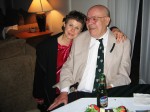George W. Hilton had a passion for trains and economics. The only things he loved more were his friends and family, the White Sox and a good bottle of beer.
Hilton, a professor of economics and transportation regulation at UCLA for 30 years, died on Aug. 4 of a heart ailment at an assisted living facility in Columbia, Maryland. He was 89.
Hilton’s friends and family knew him as a dedicated sports fan who was determined to pursue all subjects that interested him.
“You don’t find many men like him,” said his stepdaughter Amy Stefhon. “He was very honest – a man of his word.”
Hilton was born in 1925 in Chicago and received his bachelor’s degree from Dartmouth College. He received his doctorate in economics from the University of Chicago.
Whatever caught Hilton’s interest soon became a new study topic, said Barry Schutz, Hilton’s friend since 1965. Hilton would spend hours in the Library of Congress while living in Washington, D.C., writing books and doing research on trains and economics.
Hilton authored 15 books, many about transportation topics such as trains and steamboats, along with numerous articles for Trains magazine.
One correspondent for Trains, David Lester said he was 18 when he read an article about the Interstate Commerce Commission that Hilton had written for the magazine and fell in love with Hilton’s work. He said he has kept the article to this day.
In his books, Hilton described the economics behind privatized versus public transportation, the history of modes of transportation in the United States and even the study of steamships, Lester said.
Once, when he was planning to write about the 1915 Eastland boating accident on the Chicago River that left 841 passengers dead, Hilton showed his dedication by reporting extensively for the book, Stefhon said.
“He went to everyone’s grave to verify every detail; they didn’t have the Internet then,” Stefhon said. “It was the only book written in that time about that disaster, and it always was a big achievement for him.”
His attention to the people he wrote about was mirrored by the care he gave to his friends. He also donated a significant portion of his money to charities because he thought it was his duty, Stefhon said.
“He took good care of the people, associations and memberships he loved,” Stefhon said. “He would give most of his money to charities. … He thought that if he (didn’t) take care of them, they (would) disappear.”
Hilton gave generously to his alma mater Dartmouth as well as the various organizations to which he was connected, Schutz said.
In addition to his enthusiasm about transportation, Hilton’s interests expanded to numerous other subjects. He became an Anglophile after living in London, where he wrote his dissertation and became an aficionado of theater organs. He was also an avid sports fan.
When Schutz was a graduate student at UCLA in 1965, he remembers walking through a parking lot on campus and seeing a car with a White Sox pennant on the back.
“I have been a fan since I was a kid, so I waited around his car until (Hilton) showed up, and we have been friends ever since,” Schutz said.
Hilton and Schutz attended every game the White Sox played in Los Angeles, as well as many UCLA basketball games. Hilton was a dedicated UCLA fan, especially of the women’s gymnastics team because he was friends with the coach during that time and would donate to the program over the years, Schutz said.
Their friendship and shared love for the White Sox continued after their move to Washington, D.C., where Hilton spent a great deal of time doing research, Schutz said. The two had dinner together every Thursday night for 15 years and would often drive up to Baltimore to see the White Sox play the Orioles.
Schutz said he remembers Hilton’s basement walls, which were artistically lined with innumerable beer souvenirs and paraphernalia, along with a specially commissioned portrait of the Braves’ left-handed pitcher Warren Spahn.
Hilton was loyal to his hometown of Chicago, and the two also bonded over their love for the Chicago Bulls and Michael Jordan.
“He was one of the most unusual people you could ever imagine,” Schutz said. “The people who did know him thought very highly of him. I thought he was just one of the greatest people I ever knew. “
Hilton is survived by his two stepsons and four stepdaughters.
